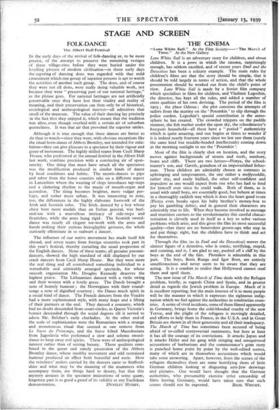THE CINEMA
"Lone White Sail." At the Film Society—" The March of Time." At the New Gallery Lone White Sail is an adventure story for children, and about children. It is a genre in which the cinema, surprisingly enough, has seldom excelled, and of recent years Emil and the Detectives has been a solitary example. The main rules for children's films are that the story should be simple, that it should be told largely in terms of action, and that -the whole presentation should be worked out from the child's point of view. Lone White Sail is made by a Soviet film company which specialises in films for children, and Vladimir Legoshin, the director, has kept all the rules, and added a number of extra qualities of his own devising. The period of the film is 1905 ; the place Odessa ; the plot concerns the attempts of sailors from the mutiny on the ' Potemkin ' to slip through the police cordon. Legoshin's special contribution is the atmo- sphere he has created. The crowded trippers on the paddle steamer, the fish market under the open sky, the schoolmaster's bourgeois household—all these have a " period " authenticity which is quite amazing, and one begins at times to wonder if it is indeed nearly fourteen years since we last saw them (surely the same kind but muddle-headed intellectuals) coming down in the morning sunlight to see the ' Potemkin '.
Most of the film is clearly shot on location, and the story moves against backgrounds of streets and roofs, seashore, boats and cliffs. There are two heroes—Piotya, the school- master's son, and Gavrik, grandson of an impoverished fisher- man. These children are admirably chosen as contrasts in upbringing and temperament, the one rather a mopycoddle, rather shy; and easily bUllied, the other self-confident and impudent as one would expect from one who has had to fend for himself ever since he could walk. Both of them, as is usual with small boys, are essentially good, but behave at times in a thoroughly caddish way which it does the heart good to see (Piotya even breaks open his baby brother's money-box to pay his gambling debts), and in general their characters are admirably true to life. When they become involved as message and munition carriers to the revolutionaries this careful charac- terisation is cleverly used in itself as a key to solve various problems which arise, and this gives the film its most successful quality—that there are no benevolent grown-ups who step in and put things right, but the children have to think and act for themselves.
Through the film (as in Emil and the Detectives) moves the sinister figure of a detective, who is comic, terrifying, stupid, and cunning, and is, I am glad to say, pushed off a cliff by the boys at the end of the film. Plotnikov is admirable in this part. The boys, Boris Runge and Igor Boot, are entirely unselfconscious and never seem to be aware that they are acting. It is a comfort to realise that Hollywood cannot steal them and spoil them.
The new issue of The March of Time deals with the Refugee problem, briefly, as regards China and Spain, and in greater detail as regards the Jewish problem in Europe. Much of it is excellent reporting, but the main interest of it to most people will be the manner in which it expresses the righteous indig- nation which we feel against the authorities in totalitarian coun- tries. A series of vivid incidents, some of them filmed apparently in Germany, brings home the cold-blooded cruelty of the new Terror, and the plight of the refugees is movingly detailed, and efforts to help them in France, in the U.S.A. and in Great Britain are shown in all their generosity and all their inadequacy. The March of Time has sometimes been accused of being afraid of so-called controversial statements, but here at least it has all the courage of its convictions. It attacks Japan and it attacks Hitler and his gang with stinging and unequivocal accusations of barbarisms and the commentator's grim story is punched home point by point by the well-edited scenes, many of which are in themselves accusations which would take some answering. Apart, however, from the scenes of the refugees themselves there are some horrifying shots of little German children looking at disgusting anti-Jew drawings and pictures. One would have thought that the German authorities, who presumably exercise strict censorship of films leaving Germany, would have taken care that such scenes should not be exported. BASH. WRIGHT.






































 Previous page
Previous page